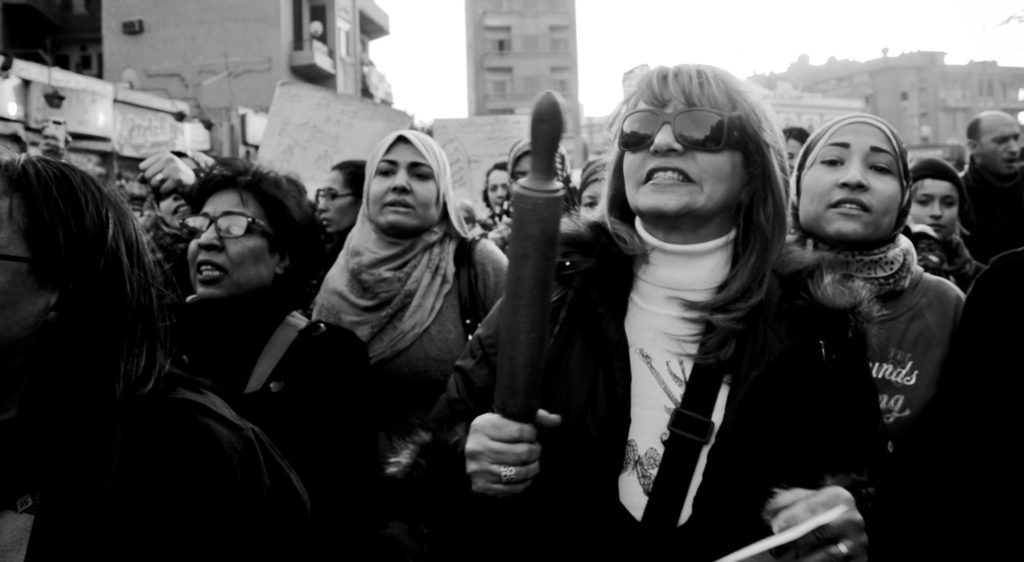Egypt’s other revolution erupts under the radar
By Khaled Diab
A decade after Egyptians rose up against Hosni Mubarak, the counterrevolution appears victorious in the political domain. However, under the radar, a social revolution is in motion.

Photo: Gigi Ibrahim, Flickr.
Thursday 25 February 2021
On the 10th anniversary of the uprising that led to the downfall of Egypt's longstanding dictator Hosni Mubarak, it remains too early to tell whether or not the revolution will ultimately succeed.
However, what is abundantly clear is that the heavily armed counterrevolution has brutally crushed the unarmed revolution. The sustained effort of millions of people between 2011 and 2013, who risked their lives and livelihoods to stand up to the three menaces of Mubarak, the military and the Muslim Brotherhood was insufficient to keep a resurgent dictatorship at bay.
Abdel-Fattah al-Sisi managed to hijack the second major wave of the revolution, this time targeted at the incompetent and divisive Muslim Brotherhood, to engineer a lethal coup against Egypt's elected president Mohamed Morsi.
In his effort to claw back control for the military and anoint himself leader, the former director of military intelligence has exhibited little intelligence or sophistication. Sisi stoked fear, fanned the flames of fascism and spread fake news to justify his bloody elimination of the Muslim Brotherhood.
Tolerating almost no dissent, the Sisi regime has detained, jailed or disappeared untold thousands of activists, revolutionaries and journalists of every political stripe, and has smashed Egypt's once vibrant civil society.
Those still outside prison and brave enough to voice opposition or criticism are intimidated, harassed and defamed, living with the constant threat of facing false accusations and show trials. This was amply demonstrated during the recent arrest of several of the idealists at the Egyptian Initiative for Personal Rights who continue to defend human rights despite all the risks involved.
However, while the regime holds the political revolution hostage, often in undisclosed locations, it has been powerless to stop a profound social and cultural revolution from taking place, despite often resorting to brutal means to repress these changes.
In terms of sheer numbers, the most profound change has been in the domain of women's rights and activism. Although Egypt's modern feminist movement has its roots in the 19th century, those roots were relatively shallow.
However, in the years running up to and since the 2011 revolution, women have become far more assertive and militant in their quest for equality.
This has manifested itself not only in the domain of rights but also of duties. Even though women do not enjoy equal rights in Egypt, they have shown themselves willing to make equal sacrifices. Women were integral to the anti-Mubarak movement known as Kifaya, which took off in 2004, and stood shoulder to shoulder with men on Tahrir Square and elsewhere in the country during the revolution.
In the social domain, women have not only proven themselves to be the equal of men in the professional and academic spheres, they are growing louder in their demands for equal rights and to be treated with respect and dignity.
Having gained over decades more academic and economic freedom, women are now demanding greater social freedom and control over their own lives. This is reflected in the burgeoning number of women who remain single, some even living alone, and are fighting the social stigma associated with it.
Women have also been struggling to take control of their bodies. This is visible in how Egyptian women are having fewer children and having them later in life. It can also be seen in the rising number of women who are rejecting or abandoning the hijab, as well as the headscarfed women who have chosen the more permissive lifestyles previously associated with their liberal sisters, such as going out late at night, partying and engaging in intimate relationships with men.
There has been a backlash against women's rising visibility and assertiveness in the public domain. Manifestations of this include the sexual harassment epidemic, the slut shaming of women who do not fit certain conservative templates and other forms of toxic masculinity.
But, here too, women have been fighting back. For instance, female activists have established campaigns and support networks to combat sexual harassment and have been instrumental in challenging and questioning the stereotypes and assumptions that objectify women and blame the victim.
The past decade has also witnessed the rising assertiveness of young people in Egypt. Not only did Egypt's marginalised youth majority spearhead the revolution, many have refused to abide by the traditional deference expected of them. Beyond the headline revolution against Mubarak, young people across the land rebelled against the mini dictators controlling their lives, against their families at home, against their teachers in the schoolyard and against their bosses in the workplace.
The labour movement in particular has been a force to be reckoned with. In the early years of the revolution, Egypt was rocked by thousands of strikes and labour actions. Even a draconian protest law was unable to stem the wave of industrial action until recently, and this required the mass arrest and jailing of labour activists.
Sex and sexuality have been another area of mixed progress. Anecdotal evidence suggests that Egypt's young have become more sexually open and liberated, which has provoked panic among older generations and the establishment, with allegations of debauchery being directed particularly at liberated young women.
However, though Egypt's relationship with sex remains problematic and closeted, even mainstream society has become relatively more open to sex, with TV sexologists becoming a trend in recent years, even amongst conservative audiences.
Belief is another surprising area of mixed progress in Egypt. After decades of social and political marginalisation and repression, sceptics, unbelievers and atheists have re-emerged, not just in Egypt but in many other Arab countries, to assert their rights amid growing tolerance and intolerance, as well as a vague “War on Atheism” launched by the Sisi regime in collaboration with al-Azhar, the country's oldest seat of Islamic learning. Although it remains risky in many circles to advertise one's unbelief, many of Egypt's irreligious have refused to be cowed, even after spending time behind bars.
Although Sisi has sold himself as a social, cultural and religious reformer to credulous or cynical foreign leaders, the reality is that the social revolution in Egypt is taking place in spite of not because of the regime.
In truth, the regime has been actively working to crush this revolution like it did the political one. But I, for one, hope that the regime will fail in this endeavour. With political reform paralysed for the time being, it is in the social sphere that the greatest hope to save Egypt from the Egyptian state rests.
______
A version of this article was published by the Institute for War and Peace Reporting (IWPR) on 9 February 2021.


